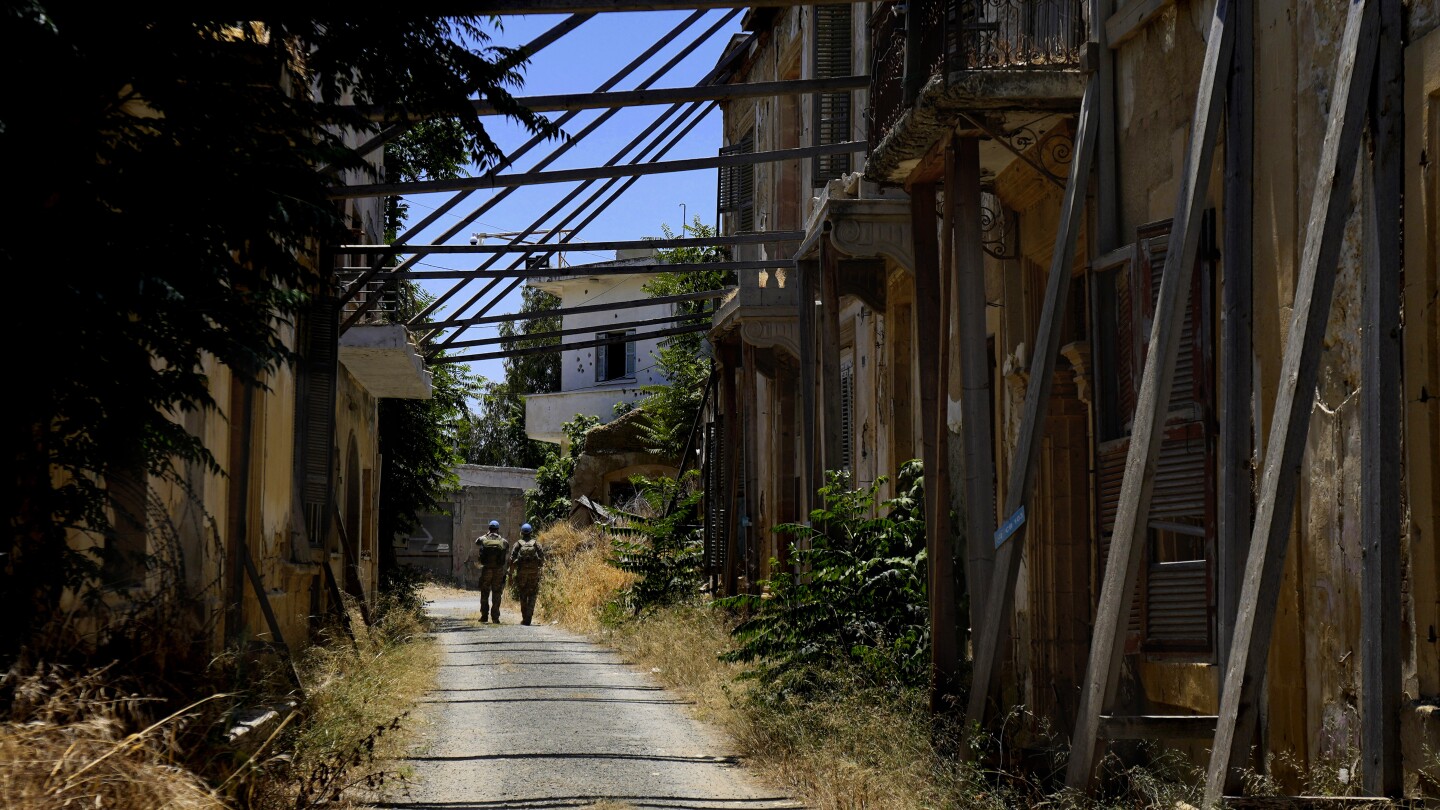NICOSIA, Cyprus (AP) — The clang of unseen assault rifles being cocked carries across the United Nations-controlled buffer zone in ethnically cleaved Cyprus, ratcheting up concerns that the embers of the island’s stagnant conflict could again be rekindled.
The rifles are just the tip of a string of recent escalations by Turkish Cypriots and Greek Cypriots, rivals separated along the 180-kilometer (120-mile) buffer zone that snakes through the capital’s medieval center.
The United Nations peacekeeping force in Cyprus, known as UNFICYP, has seen the deployment of large-caliber weapons at guard posts, such as machine guns and rocket-propelled grenades, construction of hundreds of new fighting positions as well as the installation of dozens of high-tech cameras with infrared capability that could potentially assist with artillery and missile targeting systems, the force’s outgoing Military Chief of Staff Col. Ben Ramsay said.
Such actions are considered infringing on the buffer zone, and they’ve been happening more frequently.
“No one’s listening,” Col. Ramsay told the Associated Press during a tour through the inaccessible buffer zone’s abandoned homes and businesses left to the ravages of time. “A miscalculation is a matter of time.”
The buffer zone connecting north and south — more than 6 kilometers (4 miles) at its widest, a few meters (yards) at its narrowest — serves as a reminder of the island nation’s tortured politics that culminated in a Turkish invasion in 1974, in response to a coup by supporters of union with Greece. U.N. peacekeepers had been deployed to Cyprus to quell fighting between the two communities a full decade prior to the invasion and, in its aftermath, their mandate was expanded to patrol the buffer zone.
The two sides eased their military preparedness after a 1989 deal between breakaway Turkish Cypriots in the island’s northern third and the Greek Cypriots in the south, in which they agreed to pull their forces back.
Now, on the eve of the 50th anniversary of a war that left Cyprus as the only remaining divided European Union member, heightened tensions are something the international community can ill afford — particularly on an island from where thousands of tons of humanitarian aid have been shipped to war-wracked Gaza.
So far in 2024, there’s been a 70% increase in breaches on the buffer zone compared to a year ago, Col. Ramsay said, mainly due to construction from both sides inside the neutral territory. In 2023, there was a 60% rise in such violations.
The summer months see the most infringements in what Col. Ramsay calls a “silent battle ground” on which a “game of chess being played out.”
Only 800 military staff are assigned to patrol the entire length of the buffer zone, which Col. Ramsay conceded poses a challenge. But the U.N. has its own high-tech surveillance cameras to monitor any unauthorized incursions into the buffer zone and to quickly dispatch peacekeepers to potential hot-spots before things can get out of hand, with the help of an artificial intelligence program called Python Scripts that can predict when and where buffer zone encroachments could take place. They also reopened a command post inside the Nicosia buffer zone from where peacekeepers can monitor any activity round-the-clock.
In 2023, Turkish Cypriots attacked U.N. peacekeepers after they stood in the way of work crews building a road that would have encroached on the buffer zone.
The Turkish Cypriots have challenged UNFICYP’s authority inside the buffer zone to try and pressure the world body into acknowledging the statehood they unilaterally declared in 1983. Only Turkey recognizes the breakaway state and keeps more than 35,000 troops there.
The island’s Greek Cypriot President Nikos Christodoulides put the blame for buffer zone violations squarely on Turkey and the Turkish Cypriots, although the U.N. says high-tech surveillance equipment that his government recently installed along the buffer zone also qualifies as a violation. Cypriot government officials say the cameras were installed to monitor for and prevent potential crossings of asylum-seekers to the south.
Turkey and the Turkish Cypriots have steadfastly insisted on a two-state deal that Greek Cypriots have written off as a non-starter. The two sides haven’t engaged in any real dialogue for a peace deal in seven years, since the last major push to reunify the island as a federated republic consisting of Turkish Cypriot and Greek Cypriot zones fell through.
The latest attempt by the U.N. chief’s personal envoy, María Angela Holguín Cuéllar, to bring the two sides back to the negotiating table appears to be faltering.
U.N. Chief of Mission in Cyprus Colin Stewart warned earlier in July that if attempts at peace talks stopped, there would be “consequences in the buffer zone.”
It’s a concern shared by Turkish Cypriot Ipek Borman and Greek Cypriot Anna Koukkides-Procopiou, members of the steering committee of the newly founded Cyprus Women Bi-Communal Coalition, a group dedicated to women’s equal voice and involvement in the island’s peace process.
In June, Hezbollah warned Cyprus not to allow Israel’s military to use its airports on the island to bomb Lebanon. Borman and Koukkides-Procopiou point to the threat as an example why Cyprus’ division can no longer be seen as a sidelined conflict isolated from unfolding events in a tumultuous region.
Getting the two sides back to talks is key to preventing tensions on the island from escalating to a point where open hostilities could again break out.
“Cyprus is part of a regional security puzzle, and does the world need another conflict? Does the world need another wildfire?” Koukkides-Procopiou told the Associated Press. Without a return to talks, “unfortunately, we could possibly find ourselves with an escalation of tensions which would be too late to control.”

